Google Reviews vs. Legal Directories in 2025
November 23, 2025
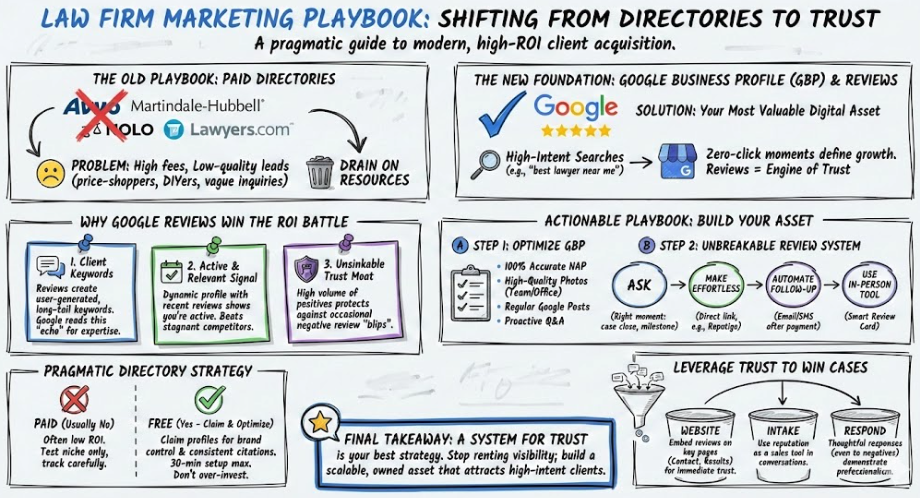
This playbook shows why focusing on Google Reviews could be the most profitable way to build trust and get more high-quality clients for your law firm.
TL;DR
This article explains why Google Reviews are a valuable asset for a modern law firm, driving high-intent clients through local SEO and building scalable trust. We provide a playbook for shifting your focus to Google.
For years, the playbook for law firm marketing seemed set: get your firm listed on Avvo, Martindale-Hubbell, Nolo, and Lawyers.com. Many firms continue to pay high monthly fees for premium listings on these platforms, feeling the pressure to be visible where they think clients are looking.
Many attorneys report that the leads generated from these paid directories are increasingly low-quality. These aren't the high-value cases/clients you're looking for. Instead, you're often flooded with low-intent inquiries:
- Aggressive price-shoppers looking for the cheapest possible representation.
- Do-it-yourselfers looking for free advice for a problem they don't intend to hire a lawyer for.
- Vague or non-serious inquiries that waste your intake team's valuable time and never convert.
When your marketing budget results in leads that drain your resources instead of building your practice, it's time to re-evaluate the strategy.
Google Reviews: Your Firm's Most Valuable Digital Asset

Here is the foundational tactic of modern legal marketing, your firm's growth is directly tied to your visibility and trust on Google.
Your best, highest-value clients aren't browsing directories.
They are searching Google and ChatGPT with urgent, high-intent phrases like, "best personal injury lawyer near me," "Springfield divorce attorney," or "emergency business litigation."
In that critical, zero-click moment, your Google Business Profile (GBP) is the single most powerful factor in convincing that searcher to click and call your firm instead of a competitor's.
And the engine of that profile is its collection of authentic, high-quality reviews.
Why Google Reviews Win the ROI Battle
Shifting your focus from paid directories to your free Google Business Profile isn't just about saving money. Unlike a static directory listing, your Google profile is a dynamic, trust-building tool that works for you 24/7.
Here's how it directly impacts your growth.
Let Your Clients Write Your Keywords
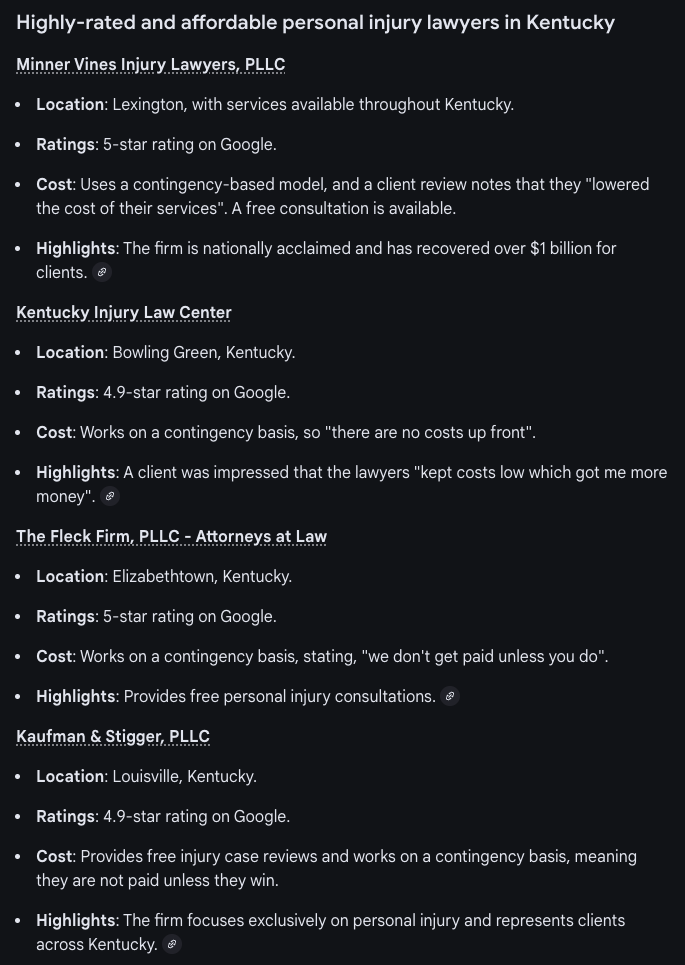
Google's algorithm is smart. It reads the text of your reviews from all platforms.
When a happy client leaves a detailed review like, "Smith & Co. was the most professional family law firm in Springfield and handled my case with care," they are providing Google with a user-generated, long-tail keyword.
Google uses this "echo" to understand your firm's specific expertise and location. This text from real clients helps you rank for the high-intent services you actually offer, not just your firm's name.
Prove You're the Active, Relevant Choice
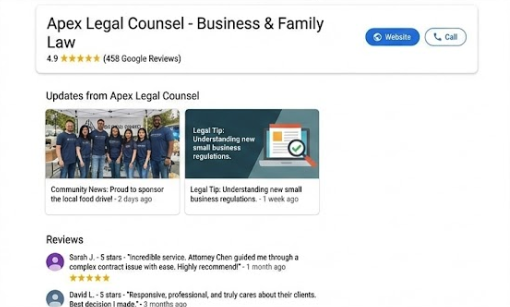
A directory listing is static. Your Google profile, however, should be dynamic. Google's algorithm loves to see activity, and a steady stream of new reviews provides a massive recency signal.
This signal proves to Google that your firm is active, serving clients, and relevant today. A high turnover of recent, positive reviews can help you outrank a competitor who has more total reviews, but hasn't received a new one in six months. It shows you're the active, trusted choice right now.
Build an Unsinkable Online Trust

Finally, a consistent review strategy builds a powerful defensive asset that protects your hard-earned reputation.
Consider two firms, like the example above.
Firm A has 150+ 5-star reviews. Firm B has 10.
Your eyes likely latch onto the 150+ and 5-star review firm more than Firm B.
When an inevitable 1-star review appears (from a disgruntled opposing party or a difficult case), it's a catastrophe for Firm B, potentially dropping their rating from 4.8 to 4.1. For Firm A, that same 1-star review is just a "blip" that barely makes a dent in their 4.9-star rating. This moat provides resilience, ensuring one bad actor can't sink your business.
Shift Your Focus from Paid Listings to Profitable Reviews
Instead of pouring money into a low-return directory, build a high-return asset that you control. This playbook is practical, scannable, and built for busy managing partners and solo attorneys.
Step 1: Claim and Optimize Your Google Business Profile (GBP)
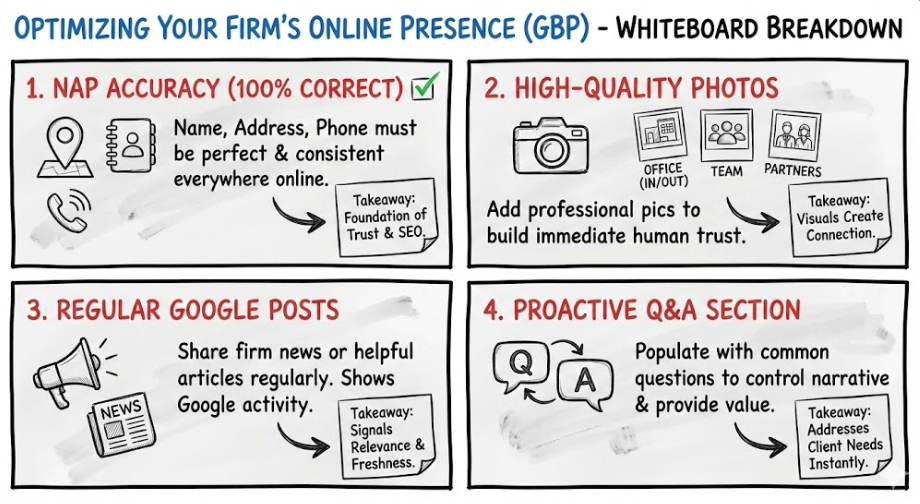
This is the non-negotiable foundation. You must treat your Google Business Profile as your real digital storefront. It's the equivalent of driving on the road and seeing your business from the car. This is online though.
- Ensure 100% Accuracy: Your firm's Name, Address, and Phone number (NAP) must be perfectly correct and consistent everywhere online.
- Upload High-Quality Photos: Add professional photos of your office (inside and out), your team, and your partners. This builds immediate human trust.
- Use Google Posts: Regularly share firm news or helpful articles. This shows Google you're active.
- Answer the Q&A Section: Proactively populate the "Questions & Answers" section with common client questions to control the narrative and provide immediate value.
Step 2: Create an Unbreakable System for Getting Google Reviews
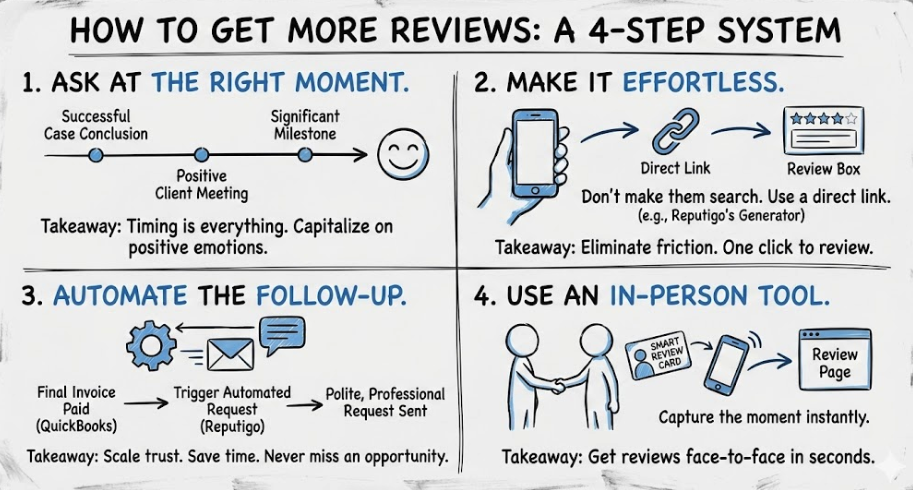
Your single most important marketing effort should be this: making it effortless to get reviews from your happy clients.
- Ask at the Right Moment: The perfect time to ask is at the successful conclusion of a case, during a positive client meeting, or after a significant, positive milestone.
- Make it Effortless: Never make a client search for your firm. Provide them with a direct link. You can use a free tool like Reputigo's Google Review Link Generator to create a simple, shareable link that takes them straight to the review box.
- Automate the Follow-Up: This is the key to scaling trust and saving time. Manually tracking follow-ups is a waste of billable hours. Using Reputigo's Automated Campaigns allows you to automatically send a polite, professional review request. You can even Connect QuickBooks to trigger the request after a client's final invoice is paid, ensuring you never miss an opportunity.
- Use an In-Person Tool: For clients you meet with face-to-face, you need to capture the positive moment immediately. A Reputigo's Smart Review Card allows a client to tap the card with their phone and go directly to your review page in seconds, while they're still in your office.
How to Pragmatically Handle Legal Directories (Avvo, Nolo, etc.)
This strategy doesn't mean you should pretend legal directories don't exist. It means you must be pragmatic and treat them for what they are.
Should You Pay for Legal Directories in 2025?
For most small to medium-sized law firms, the ROI needs to be justified. There is a lot of online chatter that the marketing budget currently allocated to premium directory listings is almost always better spent on assets you control (like your website) or higher-ROI activities (like a review management system, targeted local SEO, or Google Ads that drive traffic to your own property).
That said, every firm and market is different.
While the trend is overwhelmingly negative, you should perform your own due diligence. If you're in a niche practice area or a specific geography where a directory ranks highly, it may be worth a small, short-term test! But be sure to track the ROI meticulously.
It is critical you always test what works for your business!
The "Claim and Optimize" Strategy for Free Listings
Instead of paying, execute this simple, free strategy:
- Claim your free profiles on all major directories (Avvo, Martindale, Nolo, etc.). This is about controlling your brand and information.
- Ensure information is accurate. Your NAP and firm description must be 100% accurate and identical to your Google Business Profile. This consistency helps your overall SEO.
- Add a strong link back to your firm's main website.
- Do not invest significant time or money beyond this basic 30-minute setup.
Treat these free listings as simple "citations" that support your local SEO, not as primary lead-generation channels.
Leverage Your New Trust to Win More Cases
Getting the review is only step one. Step two is turning that review into a powerful marketing asset that wins you more cases. This is how you maximize your "Social Proof ROI."
Turn Your 5-Star Reviews into Your Best Marketing Assets
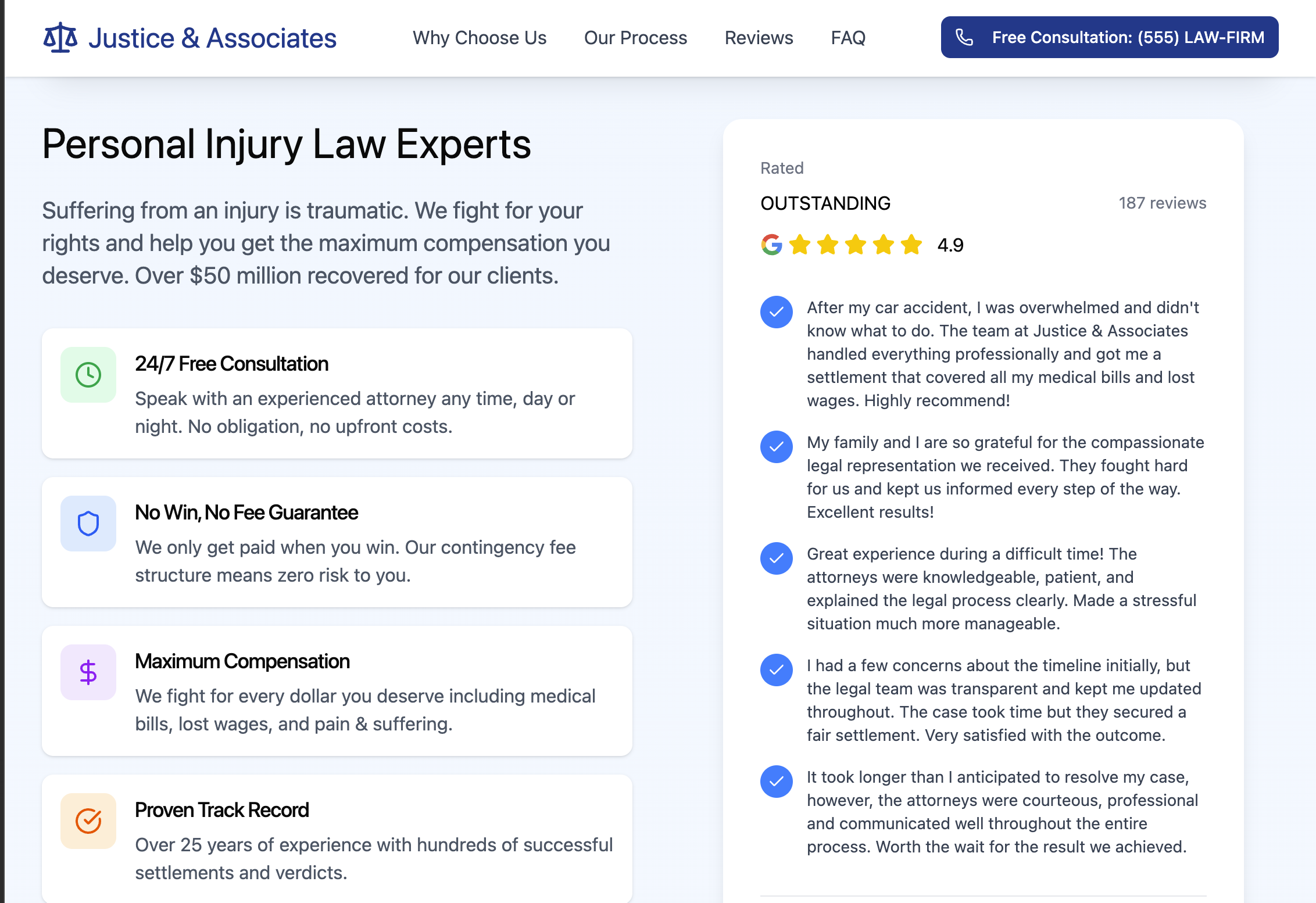
Don't let your best reviews just live on Google. Use them on your own website and in your intake process to close leads.
- Showcase Reviews on Your Website: Embed your most compelling, text-rich reviews directly on your "Contact," "Case Results," or practice area pages. This builds immediate, undeniable trust with a potential client who is seconds away from contacting you. You can do this in minutes with tools like Reputigo's Reviews Widget.
- Use Reviews in Your Intake Process: Instruct your intake team to use your reputation as a sales tool. A simple phrase like, "As you can see from our 200+ 5-star reviews on Google, we take client success very seriously," can be the deciding factor for a client on the fence.
- Respond to Every Review: This is a powerful, high-visibility marketing opportunity, not an admin chore. A thoughtful, professional response to a 1-star review can often win more new clients than ten 5-star reviews, because it publicly demonstrates that you are fair, responsive, and professional even in difficult situations. You can use our free and basic Review Response Generator to craft the perfect, polished reply every time.
Your Best Marketing Strategy
The most profitable, scalable, and effective way to grow your law firm is to build a powerful, automated system for collecting and showcasing your authentic Google Reviews.
This strategy builds lasting trust, drives high-intent clients from local SEO, and ultimately puts more money in your pocket by converting more of the clients you actually want.
For law firms ready to stop guessing and start growing, building a five-star reputation is the critical first step. Learn more about Reputigo's reputation management solutions for Attorneys & Law Firms.
FAQs
Is Avvo worth it in 2025?
or most law firms, it depends... While a free profile is good to claim, the ROI on paid Avvo listings is typically very low as of recent. We recommend investing in your own website's local SEO and Google Business Profile instead. However, you should do your own due diligence, as niche practice areas in certain locations may see different results.
Are Google Reviews more important than Martindale-Hubbell ratings?
Yes, for client acquisition. Martindale-Hubbell ratings are primarily for peer-to-peer recognition. Potential clients, however, are searching on Google and trust Google Reviews in 2025 far more to make a hiring decision.
What's the easiest way to get more Google Reviews for my law firm?
The easiest way is to use a complete system. Combine an in-person tool like Reputigo's Smart Review Card for face-to-face interactions with automated follow-ups like Reputigo's Automated Campaigns that send review requests via email or SMS after a case is closed.
How much does Reputigo cost?
You can affordably collect reviews with Reputigo. The platform offers a $0 forever free tier.
For more advanced features, we have clear, flat-rate plans that start at $14.95 per month - less than 50 cents a day. These upgraded plans let you send SMS, personalize messages, and automatically follow-up on reviews so you get more.
For more advanced features, we have clear, flat-rate plans that start at $14.95 per month - less than 50 cents a day. These upgraded plans let you send SMS, personalize messages, and automatically follow-up on reviews so you get more.





















